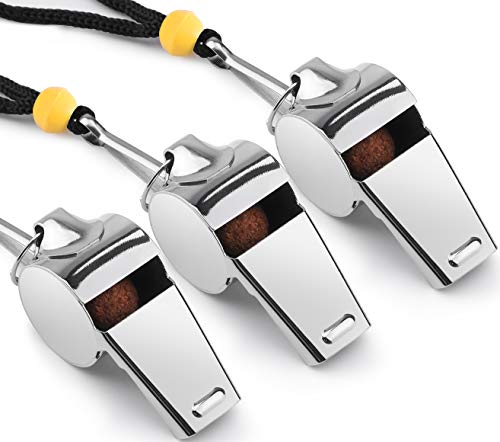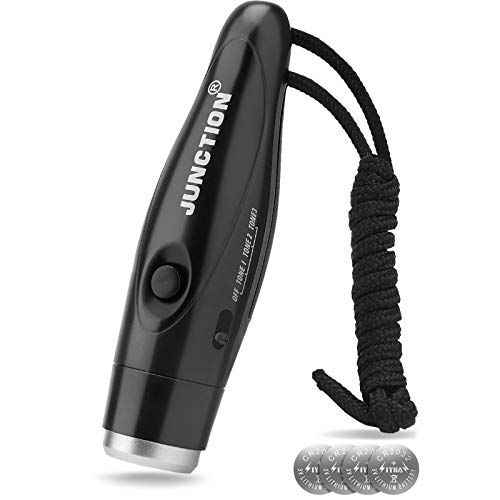Coach & Referee Whistles: The Sound of Sportsmanship

- 1. Coach & Referee Whistles: The Sound of Sportsmanship
- 1.1. What Are Coach & Referee Whistles?
- 1.2. Types Of Whistles
- 1.3. The Purpose of Whistles
- 1.3.1. Coach Whistles
- 1.3.2. Referee Whistles
- 2. What Should You Look For In A Coach & Referee Whistle
- 2.1. Volume and Sound
- 2.2. Durability and Construction
- 2.3. Comfort and Grip
- 2.4. Adjustable Pitch
- 2.5. Hygiene and Maintenance
- 2.6. Whistle Lanyard
- 2.7. Compliance with Regulations
- 3. The Symbolism of Whistles
Sports play a fundamental role in our society, uniting individuals and cultivating values such as competition, teamwork, and sportsmanship. Within the realm of sports, coaches and referees hold pivotal positions in guaranteeing the smooth and equitable execution of games. A device that has become emblematic of these roles is the whistle. Coach and referee whistles have evolved into iconic representations of authority and fair play, underscoring their profound importance.
What Are Coach & Referee Whistles?
Coach and referee whistles serve as indispensable instruments in sports and various activities for conveying directions, marking the commencement or conclusion of a match, and upholding regulations. These compact, hand-held gadgets emit a unique sound when air is forced through them. Typically crafted from either metal or plastic, whistles are composed of a mouthpiece, a chamber, and an enclosed pea or ball.
Types Of Whistles
There are various types of whistles on the market, each possessing unique characteristics and serving specific purposes. The most prevalent varieties include:
- Pea Whistles: These whistles incorporate a small pea or ball inside their chamber, which shifts when blown, resulting in a distinctive sound. Pea whistles find widespread use in sports due to their sharp and penetrating tones.
- Finger Whistles: Designed to be worn on the finger, finger whistles enable referees or coaches to maintain hands-free control. They prove particularly convenient in sports where hand gestures or signals play a crucial role, such as basketball or volleyball.
- Electronic Whistles: Electronic whistles rely on battery-powered mechanisms to generate a sound upon activation. They are often employed in noisy environments or sports where a louder and consistently audible sound is necessary. Electronic whistles also prove beneficial for referees with respiratory concerns or those who prefer not to blow directly into a whistle.
The Purpose of Whistles
Whistles play a vital role as a communication tool on the field or court, facilitating the conveyance of crucial messages to both players and spectators by coaches and referees alike. They serve as signals for commencing or concluding a game, identifying fouls or violations, and drawing attention to specific actions. The sharp and distinctive sound produced by a whistle effectively cuts through the cacophony of the game, instantly capturing the focus of all involved parties.
Coach Whistles
Coaches bear the responsibility of guiding and instructing their teams during practice sessions and matches. A coach's whistle serves as an indispensable instrument for maintaining control and discipline on the field. Its sound signifies the commencement or conclusion of a drill, a change in activity, or a call for attention. This powerful tool allows coaches to assert their authority and ensures that their directives are heard by all players.
Coach whistles are available in various designs, but the most common variant is the pea whistle. This type of whistle contains a small ball (referred to as the pea) within it, which moves back and forth when air is blown through the whistle. The pea's motion generates the distinctive sound associated with coach whistles. The pea whistle's sound is both loud and sharp, rendering it ideal for penetrating the din of a congested field or gymnasium.
Referee Whistles
Referees, conversely, are entrusted with enforcing the rules of the game and upholding fairness. Referee whistles serve as their principal means of communication with players, coaches, and spectators. Referees utilize their whistles to signal fouls, violations, and other transgressions, as well as to halt play when necessary.
Referee whistles are meticulously designed to produce a resounding and unambiguous sound that can be heard above the game's tumult. They are typically crafted from metal or plastic and frequently incorporate a cork ball inside to generate the desired sound. Over time, the design of referee whistles has evolved, with contemporary versions incorporating features such as adjustable pitch and volume control to cater to diverse sports and environments.
What Should You Look For In A Coach & Referee Whistle
Given the multitude of choices available on the market, selecting the right whistle can prove to be a daunting task. In this article, we will explore the crucial factors to contemplate when in search of a whistle suitable for coaches and referees.
Volume and Sound
The volume and sound emitted by a whistle stand as paramount considerations. It is imperative that the whistle possesses sufficient loudness to be distinctly heard amidst the tumultuous environment of a sports event. The sound should be sharp and unmistakable, capable of piercing through the cacophony and arresting everyone's attention. It is highly advisable to test the whistle's sound before making a purchase to ascertain that it meets your specific requirements.
Durability and Construction
Coaches and referees frequently find themselves in physically demanding situations, necessitating the durability of their whistle. Seek out a whistle crafted from premium materials like stainless steel or robust plastic. Such materials not only offer resilience but also resist rust and corrosion. Furthermore, a whistle with a robust construction is less prone to breakage or malfunction during intense moments in a game.
Comfort and Grip
Given that coaches and referees may need to employ their whistle repeatedly throughout a game, the comfort and grip of the whistle are pivotal factors. Look for a whistle that feels comfortable when held and boasts an ergonomic design. Whistles featuring finger grips or non-slip surfaces prove especially advantageous as they ensure a secure hold even in sweaty or wet conditions. A comfortable and well-designed whistle allows you to concentrate on the game without concerns about discomfort or slippage.
Adjustable Pitch
Distinct sports necessitate different whistle pitches for conveying specific messages or signals. Hence, having a whistle with an adjustable pitch can be advantageous. This feature enables coaches and referees to tailor the whistle's sound to their specific needs. Whether it calls for a high-pitched blast to halt play or a lower tone to signal fouls, an adjustable pitch whistle confers versatility and adaptability in communication.
Hygiene and Maintenance
Maintaining proper hygiene is of utmost importance, particularly when multiple individuals use the same whistle. Search for a whistle that is easy to clean and sanitize. Whistles furnished with detachable mouthpieces or those that can be disassembled for cleaning are highly recommended. This attribute ensures that the whistle remains free from bacteria and germs, thereby reducing the risk of infections or illnesses.
Whistle Lanyard
A whistle lanyard, although small, can wield significant influence. It enables coaches and referees to keep their whistle readily accessible at all times. Seek out a lanyard that combines durability with comfort when worn and exhibits secure attachment mechanisms to prevent inadvertent loss. Certain lanyards even come equipped with quick-release features, facilitating easy detachment in emergency situations.
Compliance with Regulations
Distinct sports organizations may impose specific regulations governing the type of whistle permitted for use. It is imperative to verify that the chosen whistle adheres to these regulations. Consult with the governing body or league to gain insight into any particular requirements pertaining to whistle design, materials, or sound limitations. This proactive approach will help you steer clear of potential issues or penalties during games.
The Symbolism of Whistles
In addition to their practical functions, coach and referee whistles have evolved to symbolize authority, equity, and the spirit of sportsmanship. The sound of a whistle demands respect and immediate attention, effectively conveying the message that a decision has been rendered or action is required. Both players and spectators comprehend that the whistle embodies the authoritative voice on the field, and they are obligated to adhere to its directives.
Furthermore, the whistle serves as a poignant reminder of the significance of fair play and adherence to the rules. Referees employ their whistles to penalize infractions and breaches, guaranteeing that the game is conducted in accordance with the principles of sportsmanship. Coaches utilize their whistles to uphold discipline and order, instilling in their players the virtues of respect and teamwork.
In conclusion, coach and referee whistles transcend their utilitarian role in sports; they stand as powerful symbols of authority, equity, and sportsmanship. The unique sound of a whistle captures immediate attention from players, coaches, and onlookers, facilitating crucial communication and ensuring the seamless execution of games. Whether it's a coach's whistle directing a team during practice or a referee's whistle upholding the game's rules, these modest instruments wield considerable influence in the realm of sports. Therefore, when you hear the piercing note of a whistle next time, reflect upon the values it embodies and the paramount significance of fair play in the world of sports.











